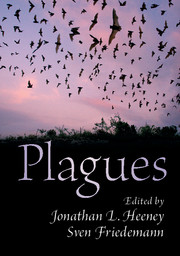Book contents
- Frontmatter
- Dedication
- Contents
- List of Figures
- List of Tables
- Notes on Contributors
- Foreword
- Preface
- Acknowledgements
- 1 Ebola: The Plague of 2014/2015
- 2 Plagues and History: From the Black Death to Alzheimer's Disease
- 3 Plagues and Medicine
- 4 The Nature of Plagues 2013–14: A Year of Living Dangerously
- 5 Plagues, Populations and Survival
- 6 Plagues and Socioeconomic Collapse
- 7 Silicon Plagues
- 8 The Human Plague
- 9 Plague as Metaphor
- Index
- References
9 - Plague as Metaphor
Published online by Cambridge University Press: 24 March 2017
- Frontmatter
- Dedication
- Contents
- List of Figures
- List of Tables
- Notes on Contributors
- Foreword
- Preface
- Acknowledgements
- 1 Ebola: The Plague of 2014/2015
- 2 Plagues and History: From the Black Death to Alzheimer's Disease
- 3 Plagues and Medicine
- 4 The Nature of Plagues 2013–14: A Year of Living Dangerously
- 5 Plagues, Populations and Survival
- 6 Plagues and Socioeconomic Collapse
- 7 Silicon Plagues
- 8 The Human Plague
- 9 Plague as Metaphor
- Index
- References
Summary
There is a real difference between describing a public health crisis as an epidemic and calling it a plague. As far back as we can go in the European tradition, words associated with ‘plague’ carry an extra charge; they connote something more than accident and bring into the account we give of medical disaster the suggestion of some kind of personal agency. Homer's Iliad famously starts with a picture of disaster, sickness striking the Greek troops under the walls of Troy, and shows us the god Apollo unleashing his arrows against animals and human beings, in revenge for an insult offered to one of his priests. In the first book of the Iliad, the sickness is variously called nousos, loimos and loigos: roughly, a disease, an outrage or injury, and a disaster or devastation – though Homer does use plege elsewhere, the origin of the Latin plaga – a blow or stroke. Simple description gives way to a mode of speaking that is not only dramatically personal but also moralised: sickness is not only connected with someone's agency but is understood as a moral consequence of events, a punishment.
At the most obvious level, speaking like this is a way of asserting meaning in a situation where we may otherwise feel helpless, at the mercy of arbitrary forces. It may not exactly be welcome to think of ourselves as receiving punishment for our misdeeds; but it makes sense of a kind. When the workings of natural processes are made personal in this way, we can imagine ‘negotiating’ with them: what we do or say may make a difference. Even if we are too late to avert the plague that now afflicts us, we can perhaps shorten its duration by searching out the cause and taking appropriate remedial action, and we may be better able to avoid such disasters in future. Plague understood in this sense as the stroke of a hostile agent prompts us to examine our memories, to retell our stories, so that we can discover what we ought to negotiate about and with whom.
- Type
- Chapter
- Information
- Plagues , pp. 196 - 212Publisher: Cambridge University PressPrint publication year: 2017
References
- 4
- Cited by



